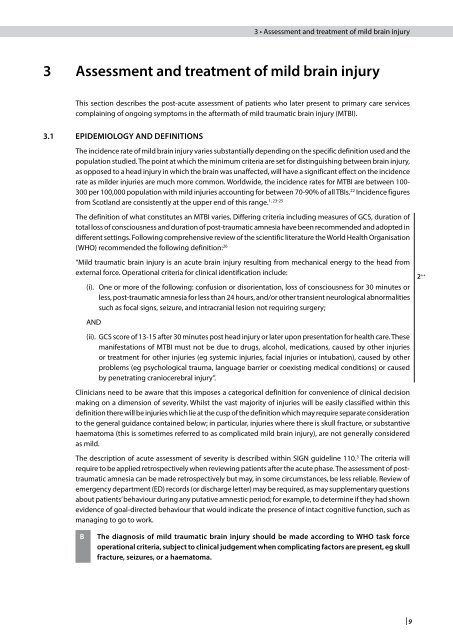sign130
sign130
sign130
Create successful ePaper yourself
Turn your PDF publications into a flip-book with our unique Google optimized e-Paper software.
3 Assessment and treatment of mild brain injury<br />
This section describes the post-acute assessment of patients who later present to primary care services<br />
complaining of ongoing symptoms in the aftermath of mild traumatic brain injury (MTBI).<br />
3.1 EPIDEMIoloGy AND DEfINITIoNS<br />
The incidence rate of mild brain injury varies substantially depending on the specific definition used and the<br />
population studied. The point at which the minimum criteria are set for distinguishing between brain injury,<br />
as opposed to a head injury in which the brain was unaffected, will have a significant effect on the incidence<br />
rate as milder injuries are much more common. Worldwide, the incidence rates for MTBI are between 100-<br />
300 per 100,000 population with mild injuries accounting for between 70-90% of all TBIs. 22 Incidence figures<br />
1, 23-25<br />
from Scotland are consistently at the upper end of this range.<br />
The definition of what constitutes an MTBI varies. Differing criteria including measures of GCS, duration of<br />
total loss of consciousness and duration of post-traumatic amnesia have been recommended and adopted in<br />
different settings. Following comprehensive review of the scientific literature the World Health Organisation<br />
(WHO) recommended the following definition: 26<br />
“Mild traumatic brain injury is an acute brain injury resulting from mechanical energy to the head from<br />
external force. Operational criteria for clinical identification include:<br />
(i). One or more of the following: confusion or disorientation, loss of consciousness for 30 minutes or<br />
less, post-traumatic amnesia for less than 24 hours, and/or other transient neurological abnormalities<br />
such as focal signs, seizure, and intracranial lesion not requiring surgery;<br />
AND<br />
3 • Assessment and treatment of mild brain injury<br />
(ii). GCS score of 13-15 after 30 minutes post head injury or later upon presentation for health care. These<br />
manifestations of MTBI must not be due to drugs, alcohol, medications, caused by other injuries<br />
or treatment for other injuries (eg systemic injuries, facial injuries or intubation), caused by other<br />
problems (eg psychological trauma, language barrier or coexisting medical conditions) or caused<br />
by penetrating craniocerebral injury”.<br />
Clinicians need to be aware that this imposes a categorical definition for convenience of clinical decision<br />
making on a dimension of severity. Whilst the vast majority of injuries will be easily classified within this<br />
definition there will be injuries which lie at the cusp of the definition which may require separate consideration<br />
to the general guidance contained below; in particular, injuries where there is skull fracture, or substantive<br />
haematoma (this is sometimes referred to as complicated mild brain injury), are not generally considered<br />
as mild.<br />
The description of acute assessment of severity is described within SIGN guideline 110. 3 The criteria will<br />
require to be applied retrospectively when reviewing patients after the acute phase. The assessment of posttraumatic<br />
amnesia can be made retrospectively but may, in some circumstances, be less reliable. Review of<br />
emergency department (ED) records (or discharge letter) may be required, as may supplementary questions<br />
about patients’ behaviour during any putative amnestic period; for example, to determine if they had shown<br />
evidence of goal-directed behaviour that would indicate the presence of intact cognitive function, such as<br />
managing to go to work.<br />
B The diagnosis of mild traumatic brain injury should be made according to WHo task force<br />
operational criteria, subject to clinical judgement when complicating factors are present, eg skull<br />
fracture, seizures, or a haematoma.<br />
| 9<br />
2 ++


